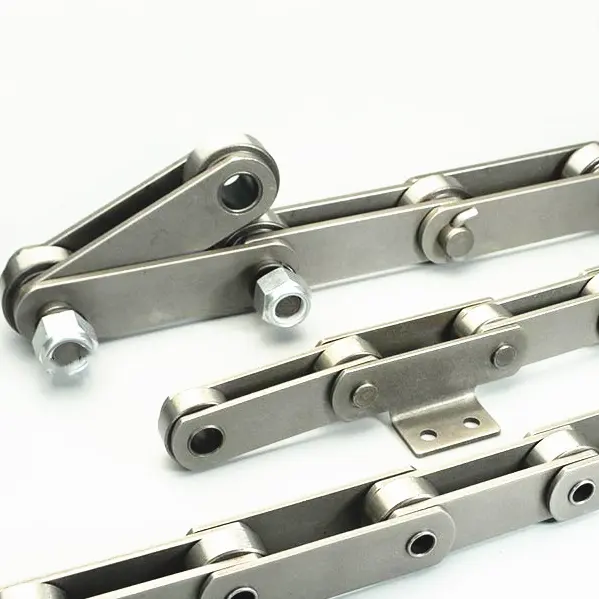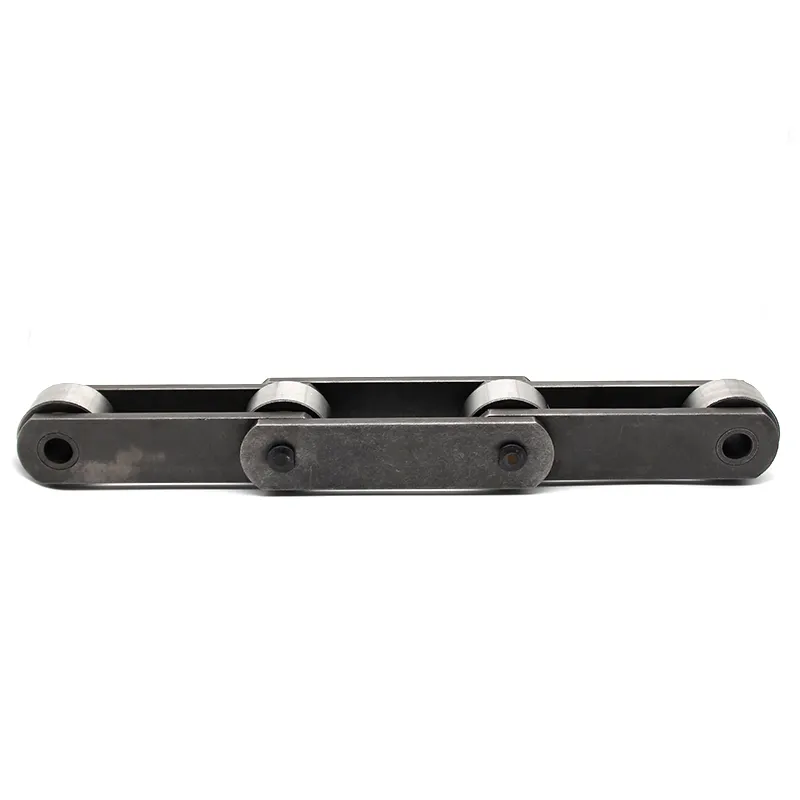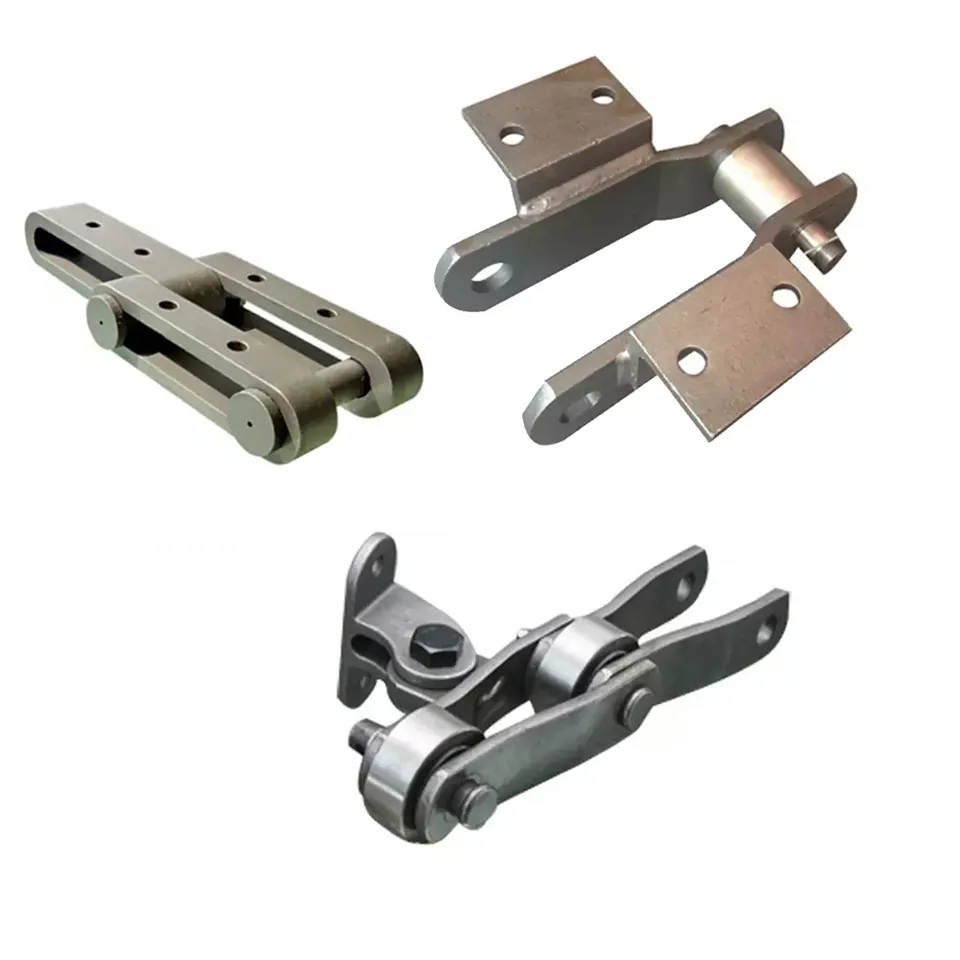Product Description
Welded Mill Chain with Attachments
A1/A2 K1/K2 R2/RR2 S1 F4 H1/H2 RF2/RF12 A22
Straight sidebar welded steel chain
Offset Sidebar Welded Steel Chains
Welded Steel Mill and Drag Chains
W Series Welded Steel Mill Chain
WH Series Welded Steel Mill Chain
WD Series Welded Steel Drag Chain
WD welede steel chain c/w heat treated rivets
WH welded steel chain-fully heat treated
WHIBR fully heat treated plus further induction hardened barrels&rivets
WHIBRS same as IBR plus sidebar wear surfaces
WD welded steel drag chain
XHD extra heavy duty
CS cast steel barrel
Welded steel drag chain is built according to ISO 6971 and ANSI B29.;18M.; Products provide efficient and economical service when used in chip and sawdust conveyors,; and like applications.; Reverse barrel is available.; Attachments includes C1,; C3,; C4,; RR and Wing.;
With their large wide pushing area,; welded steel drag chains provide sizeable carrying capacity when operated at moderate speeds.; They can be run in the same troughs and on the same sprockets as their cast chain counterparts.;
Welded Steel Mill Chain includes offset sidebar welded steel mill chain(or cranked link welded steel mill chain);,; straight sidebar welded steel mill chain and welded stainless steel mill chain as per ISO 6972 and ANSI B29.;16M.; These versatile welded steel chains are used throughout the forest products industry and paper processing industries as economical alternative for comparable cast chains.; Manufactured with the most advanced techniques,; equipment and high quality steels,; these chains offer improved resistance to wear and shock loads for a broad range of applications of conveying,; transmission and elevations.; A variety of attachments are also available for different conveyor and elevator applications:; A1,; A2,; A22,; F2,; F4,; H1,; H2,; K1,; K2,; R1,; RR1,; R2,; R22,; W1.;
Welded steel mill chains are recommended for most conveying,; driving,; and elevating applications where a high-strength steel rollerless chain is required.; These chains will operate on the same sprockets as their cast chain counterparts.;
The direction of travel for welded Mill Chain is determined by the application.; If used in a conveyor application,; the direction should be with the open end first.; If used as a drive chain,; the closed end,; or the end with the barrel,; should be first.;
Chain No.; WR-78/WR-78-4/WR-82/WR-124/WR-111/WR-106/WR-132/WR-150/
WR-155/WR-157/WR-159/WR-200/
WH-78/WH-82/WH-124/WH-111/WH-132/WH-150/WH-155/WH-157/WH-159/WH-200
| Mill chain attachments |
| We 24 hours service for you! |
| Standard or Nonstandard: | Standard |
|---|---|
| Application: | Textile Machinery, Garment Machinery, Conveyer Equipment, Packaging Machinery, Electric Cars, Motorcycle, Food Machinery, Marine, Mining Equipment, Agricultural Machinery, Car |
| Surface Treatment: | Baking Paint |
| Structure: | Welded Chain |
| Material: | Cast Iron |
| Type: | Cranked Link Chain |
| Samples: |
US$ 15.71/Meter
1 Meter(Min.Order) | |
|---|
| Customization: |
Available
| Customized Request |
|---|
What are the limitations of using mill chains in certain industries or applications?
While mill chains are versatile and well-suited for many industrial applications, they do have some limitations that need to be considered when choosing the right chain for specific industries or applications:
1. Speed Limitations: Mill chains may have limitations on their maximum allowable speed. High-speed applications may require specialized chains designed to handle the increased forces and loads associated with faster operation.
2. Environmental Factors: Harsh operating environments, such as extremely high or low temperatures, corrosive chemicals, or abrasive materials, can affect the performance and longevity of mill chains. In such cases, specialized chains with appropriate coatings or materials may be required.
3. Noise and Vibration: Mill chains can generate noise and vibration during operation, which can be a concern in certain industries or applications where quieter and smoother operation is desired.
4. Misalignment Issues: Misalignment between sprockets can cause premature wear and failure of mill chains. Proper alignment and regular maintenance are essential to ensure optimal performance and longevity.
5. Weight Considerations: In applications where weight is a critical factor, the weight of the mill chains themselves may need to be taken into account, especially when dealing with large conveying systems.
6. Shock Loads: Sudden and heavy loads can put extra stress on mill chains, potentially leading to failure if not properly accounted for in the chain’s design and selection.
7. Customization Challenges: In some cases, unique applications may require highly customized chain designs, which can be more challenging and costly to manufacture.
8. Water and Moisture: Excessive exposure to water and moisture can lead to rust and corrosion, reducing the chain’s lifespan. In environments where water or moisture is prevalent, chains with appropriate coatings or materials should be used.
9. Chemical Resistance: Certain chemicals can be detrimental to the material properties of mill chains. When working with chemicals, it is essential to choose chains that offer the necessary chemical resistance.
Despite these limitations, proper selection, installation, and maintenance of mill chains can overcome many challenges and ensure their effective and reliable performance in various industries and applications.
How do mill chains handle the movement of materials with varying shapes and sizes?
Mill chains are designed to handle the movement of materials with varying shapes and sizes in industrial applications. They are well-suited for conveying bulk materials, including granular, powdery, and irregularly shaped substances. The design and construction of mill chains enable them to efficiently transport materials with different physical forms. Here’s how mill chains handle such materials:
- Flexible and Versatile: Mill chains are flexible and can adapt to the shape and size of the materials they are conveying. The links in the chain can move and adjust to accommodate irregularly shaped objects.
- Uniform Material Transfer: The evenly spaced links in the mill chain ensure a smooth and uniform transfer of materials. This prevents material buildup or jamming during the conveying process.
- Various Chain Configurations: Mill chains come in different configurations, such as single strand, double strand, and multiple strand designs. This allows for customized solutions based on the specific material handling requirements.
- Special Attachments: Mill chains can be equipped with various attachments to suit different material handling needs. These attachments can include flights, buckets, or other components that aid in the efficient movement of materials.
- Corrosion and Abrasion Resistance: Depending on the material being conveyed, mill chains can be made from different materials with appropriate coatings or treatments to resist corrosion and abrasion, ensuring longevity and reliability.
- Low Friction: Mill chains are designed to have low friction, reducing the energy required to move materials and minimizing wear on the chain and sprockets.
Overall, mill chains are an essential component of material handling systems in various industries, providing reliable and efficient movement of materials with varying shapes and sizes. Their flexibility, uniform transfer capabilities, and various chain configurations make them suitable for handling diverse materials in industrial processes.
What materials are mill chains typically made of for different industries?
Mill chains are manufactured using various materials to suit the specific requirements of different industries and applications. The choice of material depends on factors such as the operating environment, load capacity, and resistance to wear and corrosion. Here are some commonly used materials for mill chains in different industries:
1. Carbon Steel: Carbon steel mill chains are widely used in various industrial applications due to their high tensile strength and affordability. They are suitable for medium to heavy-duty material handling tasks and can withstand harsh conditions.
2. Stainless Steel: Stainless steel mill chains are preferred in industries where corrosion resistance is crucial. They are commonly used in food processing, chemical, and pharmaceutical industries where exposure to moisture, chemicals, or high temperatures can occur.
3. Alloy Steel: Alloy steel mill chains are known for their exceptional strength and durability. They are used in heavy-duty applications, such as steel manufacturing, mining, and forestry, where the chains are subjected to significant loads and abrasion.
4. Nickel-Plated Steel: Nickel-plated steel mill chains provide additional protection against corrosion and wear. They are often used in industries where exposure to chemicals or outdoor elements is a concern.
5. Plastic or Polymer: In certain industries, such as food and beverage manufacturing or electronics, plastic or polymer mill chains may be used. These chains offer non-metallic properties, making them ideal for applications that require chemical resistance and low-noise operation.
6. Galvanized Steel: Galvanized steel mill chains are coated with a layer of zinc to enhance their corrosion resistance. They are commonly used in outdoor applications or environments where moisture and rust may be a concern.
It’s essential to choose the right material based on the specific needs of the industry and the operating conditions of the application. Factors such as load capacity, speed, temperature, and exposure to chemicals or moisture play a crucial role in determining the appropriate material for mill chains in different industries.
editor by CX 2023-11-29




